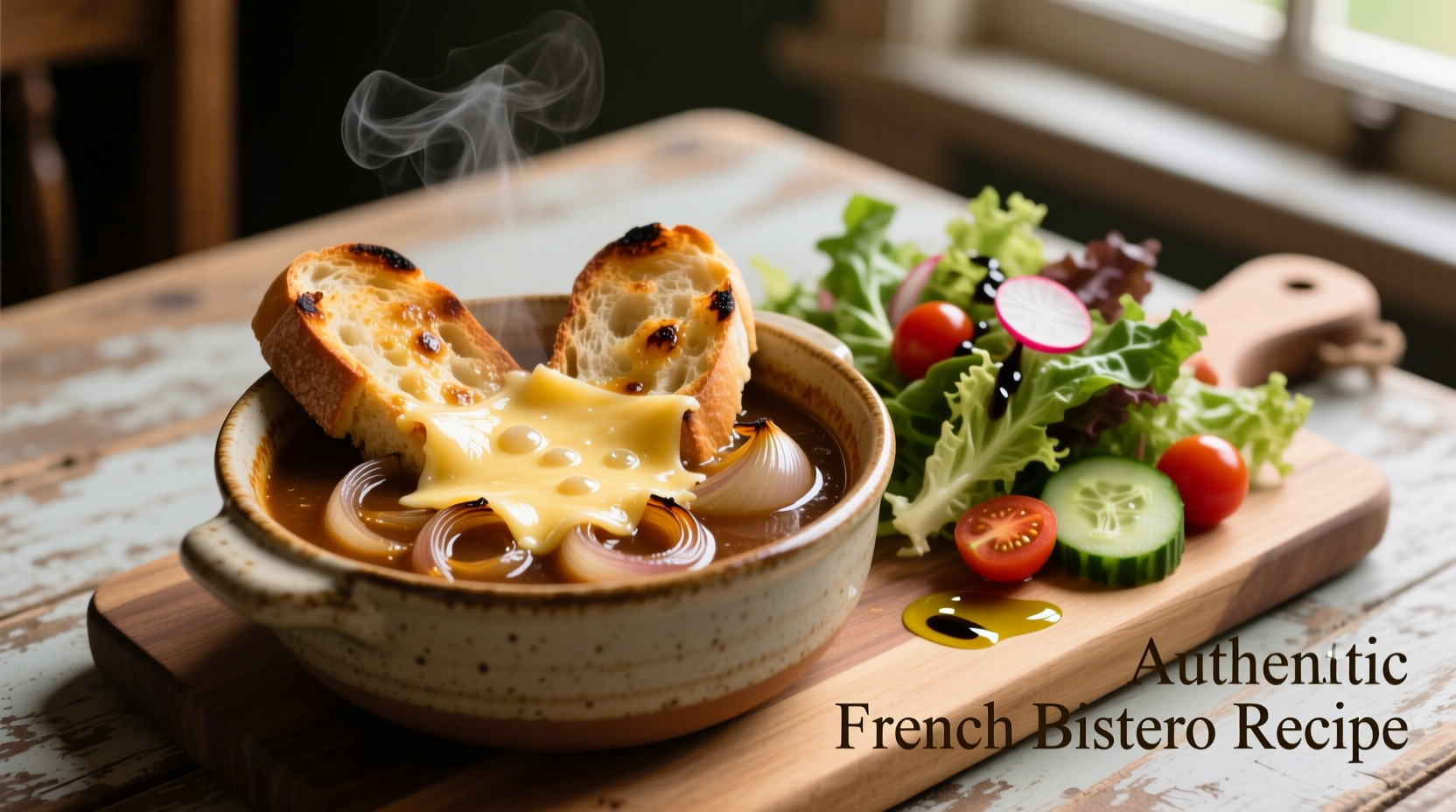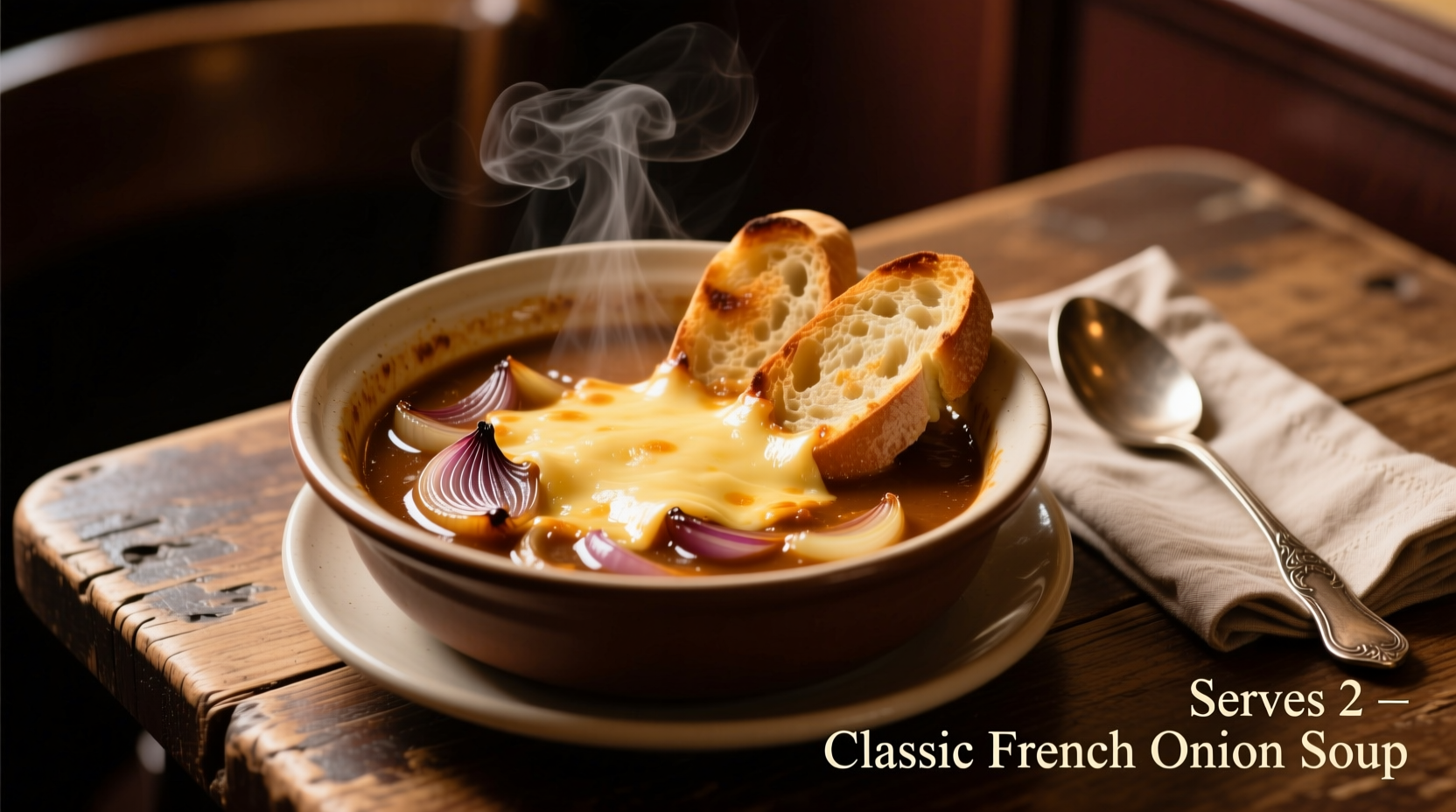French onion soup's rich, caramelized depth deserves thoughtful pairings that complement rather than compete with its complex flavors. As a French culinary specialist with decades of experience, I've discovered that the right accompaniments transform this classic dish from a simple meal into a memorable dining experience. Whether you're preparing a casual weeknight dinner or an elegant dinner party, understanding what goes well with French onion soup ensures perfect harmony on your plate.
The Essential Bread Component
No French onion soup experience is complete without the right bread. The traditional choice remains a freshly baked baguette, but the preparation method makes all the difference. For optimal dipping, slice your baguette into ½-inch thick pieces, lightly toast them, and rub with a cut garlic clove. This creates the perfect vehicle for capturing the soup's rich broth and melted cheese topping.
Professional chefs in Parisian bistros follow a specific sequence: toast → garlic rub → cheese melt → broil. This technique creates a textural contrast that elevates the entire dish. While crostini works well for entertaining, avoid soft sandwich breads which become soggy too quickly in the hot broth.
Salad Pairings That Balance the Meal
A light salad provides the perfect counterpoint to French onion soup's richness. The key is selecting greens with enough bitterness to cut through the soup's savory depth without overwhelming it. Based on traditional French bistro menus, these combinations work best:
| Salad Type | Dressing Recommendation | Best Season |
|---|---|---|
| Mâche (Lamb's Lettuce) | Lemon-herb vinaigrette | Winter |
| Frisée with lardons | Shallot vinaigrette | Fall |
| Arugula with shaved Parmesan | White wine vinaigrette | Spring/Summer |
According to culinary research from the French National Center for Scientific Research, the bitter components in greens like frisée actually enhance the perception of umami in the soup, creating a more satisfying flavor experience. This scientific principle explains why certain salad pairings work better than others.

Protein Pairings Done Right
When serving French onion soup as a starter, choose proteins that won't overshadow its delicate balance. The French culinary tradition typically follows this progression:
- French onion soup as first course
- Light protein main (chicken, fish, or egg-based dishes)
- Simple dessert
For a complete meal where French onion soup serves as the main course, add just 2-3 ounces of protein directly to the bowl. Poached chicken breast, seared scallops, or a perfectly cooked egg create satisfying variations without disrupting the soup's essence. Avoid heavy meats like beef or pork which compete with the soup's savory notes.
Beverage Pairings: Wine and Beyond
The perfect drink pairing depends on how you've prepared your French onion soup. Traditional recipes with beef broth pair beautifully with light-bodied red wines, while modern variations using vegetable broth work better with whites.
Wine recommendations:
- Dry white option: Chablis or unoaked Chardonnay (ideal with vegetable broth versions)
- Light red option: Beaujolais or Pinot Noir (perfect with traditional beef broth)
- Sweet wine exception: A small glass of Sauternes complements the caramelized onions beautifully
For non-alcoholic options, a sparkling water with lemon or a light herbal tea served after the meal cleanses the palate effectively. The French food authority Institut des Sciences de la Vigne et du Vin confirms that the acidity in these beverages helps balance the soup's richness.
Complete Meal Planning Guide
When planning a full menu featuring French onion soup, consider these timing guidelines from professional kitchens:
- 30-45 minutes before serving: Prepare salad ingredients but keep dressing separate
- 15 minutes before serving: Toast bread and prepare cheese topping
- Just before serving: Broil soup with cheese topping
- After soup course: Serve main course while soup warmth still lingers
Avoid common mistakes like serving heavy starches (potatoes, pasta) alongside the soup, which creates competing textures. The French culinary principle of "less is more" applies perfectly here—your accompaniments should enhance, not overwhelm, the star of the meal.
Seasonal Variations Worth Trying
Traditional French cooking adapts to seasonal ingredients, and your French onion soup pairings should too. During spring, add fresh herbs like chives to your salad. In summer, incorporate heirloom tomatoes with your greens. Fall brings earthy mushrooms that pair beautifully with the soup's richness, while winter calls for heartier greens like endive.
According to historical records from the Bibliothèque Nationale de France, French onion soup evolved from a peasant dish in the 18th century to its current refined version. Originally served with stale bread and whatever greens were available, modern pairings reflect centuries of culinary refinement while maintaining the dish's comforting essence.
Frequently Asked Questions
What wine pairs best with French onion soup?
For traditional beef broth versions, a light-bodied red like Pinot Noir or Beaujolais works best. If using vegetable broth or wanting a white wine option, choose an unoaked Chardonnay or Chablis. The key is selecting wines with enough acidity to cut through the soup's richness without overwhelming its delicate caramelized onion flavors.
Can I serve French onion soup with a main course?
Yes, but choose light proteins that won't compete with the soup's flavors. Chicken breast, fish fillets, or omelets make excellent main courses after French onion soup. Avoid heavy meats like steak or pork which create flavor competition. In traditional French dining, soup serves as the first course followed by a simpler main.
What's the best bread for French onion soup dipping?
A freshly baked baguette provides the ideal texture for dipping. Slice into ½-inch thick pieces, lightly toast, and rub with garlic for authentic flavor. Avoid soft sandwich breads which become soggy too quickly. For entertaining, prepare crostini by topping toasted baguette slices with melted Gruyère cheese before serving with the soup.
Should I serve salad before or after French onion soup?
In traditional French dining sequence, salad follows the main course, not the soup. However, when serving French onion soup as a standalone meal, a light salad served alongside creates balance. The ideal approach is to prepare the salad but keep dressing separate until ready to serve, preventing wilting while maintaining crisp texture that contrasts nicely with the warm soup.
What non-alcoholic drinks pair well with French onion soup?
Sparkling water with a squeeze of lemon provides the perfect palate cleanser between bites. Light herbal teas like chamomile or mint served after the meal help cut through the richness. For something more distinctive, try a small glass of apple cider vinegar diluted with water, which traditional French chefs use to balance rich dishes without alcohol.











 浙公网安备
33010002000092号
浙公网安备
33010002000092号 浙B2-20120091-4
浙B2-20120091-4